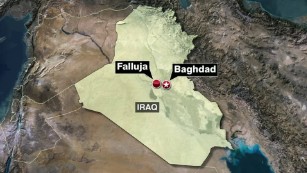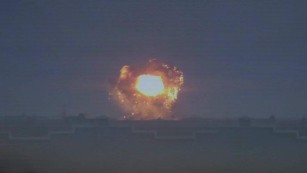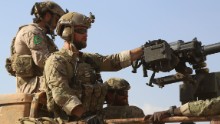Families flee as battle for Falluja rages on
Suad had feared for so long that she would die. A mother in Falluja, Iraq, her city has been at the center of war for more than a dozen years and now it is the epicenter of a battle between ISIS and Iraqi and Kurdish forces backed by the United States-led coalition.
The coalition's push to take Falluja from ISIS, which began late Sunday, prompted ISIS gunmen to go door to door in the city and yank men, their wives and children from their homes.
ISIS "kept moving us from one damaged, deserted house to another," Suad said. She, her husband and her children ran as fast as they could to avoid being shot in the crossfire.
"We tried going back to our house, but when we saw lots of other families fleeing we joined them," she said. "I was carrying my 2-year-old daughter, Hana, as I ran barefoot to reach the other families. My husband was behind us all the time trying to catch up with us as he can't run. That's how we left, taking nothing with us, not even our money. I even forgot to take my mobile phone.
Hundreds of people like Suad and her family have fled the city and its surroundings since the Falluja offensive began last week. More than 500 families have arrived in displacement camps outside the city, the Norwegian Refugee Council said, including almost 300 since Sunday afternoon alone. All the recent arrivals are from Jumeila on the city's outskirts.
Long struggle looms in battle for ISIS heartland
"We feel safe here now," Suad said. "My children are getting food, and my husband is getting treatment in (the) hospital. I can't think of anything beyond that. Arriving here safely was what mattered, and it's a big relief."
But danger remains. Water shortages in the camps are an increasing concern.
"Last night we've had the biggest number of displaced families reaching us so far," said Nasr Muflahi, the Council's country director in Iraq.
"Our resources in the camps are now very strained, and with many more expected to flee we might not be able to provide enough drinking water for everyone," Muflahi said. "The priority remains providing safe exits for at least 50,000 civilians believed to be trapped in the center of Falluja. We expect bigger waves of displacement the fiercer the fighting gets."
Storm the city
Iraqi forces started their operation to retake the ISIS stronghold with the help of Iraqi and coalition air support, Iraqi military spokesman Yahya Rasoul said on Iraqi state TV.
"With God's blessing we have launched the third phase of the operation to storm the center of Falluja city -- by our heroes in the counterterrorism forces, units of the Iraqi army and Anbar police," Rasoul said.
"There is heavy air cover for this operation from our heroes in the Iraqi air force and the coalition."

Why Falluja matters
Iraqi forces retook the village of Nuaimiya, just south of Falluja, closing in on the city itself, al-Iraqi TV reported.
Earlier Monday, Iraqi military units and supporting militia captured a handful of settlements from ISIS near Falluja, including the town of Saqlawiya, about 10 kilometers (6.5 miles) northwest of the city, and the villages of al-Buaziz, al-Bu Efan and al-Shiha, north and west of Falluja, state-run TV reported.
Iraqi government troops, backed by Shiite militias known as the Popular Mobilization Units and an air campaign by the U.S.-led anti-ISIS coalition, launched the offensive last week to retake the ISIS stronghold, about 65 kilometers (40 miles) west of Baghdad, first targeting outlying settlements.
Why suffering may not be over for Iraqis 'liberated' from ISIS
Capturing Karma, about 16 kilometers (10 miles) northeast of Falluja on Thursday, brought most of the territory east of the city under government control.
More than 5,000 Americans are providing training, advice and assistance to Iraqi forces and flowing equipment to them, United States Col. Steve Warren, a spokesman for the coalition, said on CNN's "New Day" Monday.
Iraq was "invaded by these animals" of ISIS, he said, but the terror group's grip on territory is slipping in both Iraq and Syria, he said.

Iraqi civilians flee Falluja to get away from fighting
Tens of thousands at risk
The U.N. refugee agency has warned that an estimated 50,000 people are at risk, caught in the city turned combat zone as the Iraqi military's bombardment has intensified.
"There are reports of a dramatic increase in the number of executions of men and older boys in Falluja (who are) refusing to fight on behalf of extremist forces," said Leila Jane Nassif, the U.N. agency's assistant representative in Iraq.
"And many people have been killed or buried alive under the rubble of their homes in the course of ongoing military operations."
Hundreds, mostly women and children, fled Falluja on Friday as Iraqi soldiers attacked to drive ISIS from the city, the Iraqi military said.
Security forces evacuated about 760 people who escaped from eastern and southeastern Falluja, the military said.
"Food is scarce in the city," said Um Ahmed, a 40-year-old living in Falluja with her family. "We have mostly been relying on dates for our meals."
The Norwegian Refugee Council reports the residents of Falluja have been faced with food shortages, lack of electricity and hospitals have depleted supplies of medical supplies.
"Civilians are trapped inside the city of Falluja as fighting intensifies. With every moment that passes, their need for safe exits becomes more critical. We are working around the clock in the displacement camps to provide water and emergency food rations to people who manage to flee the violence, but getting there in the first place is near impossible for those in the city center," said Nasr Muflahi, Norwegian Refugee Council country director in Iraq.
News Courtesy: www.cnn.com











